On 15 May 2023, the international day of the family, the AGF organised an event on the topic of “Family and Housing / Energy” in Berlin. In view of the burdens caused by rising housing and energy costs, the event took stock of the situation and discussed strategies and measures to improve the situation for the famiies.
Presentations on the inputs will be made available shortly (in German).
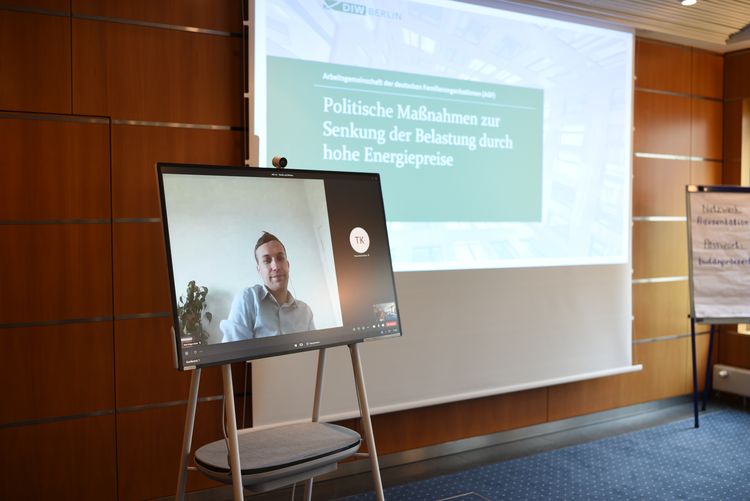
First, Mats Kröger from the German Institute for Economic Research (DIW) shed light on the burdens for families caused by high energy prices and explained, among other things, the connection between gas heating costs and household income. He showed that spending on gas increases slightly as incomes rise. However, he said, the absolute expenditures of poorer households are not significantly lower than those of richer households. As a result, the relative shares that poorer households have to spend on their gas heating are significantly higher than the relative burden on richer households. At the same time, low-income households are less likely to live in homes that are thermally insulated to modern standards than higher-income households. Because of this, the political aim to have a reduction in heating would also be a social, not only a political or a technical issue. The most vulnerable groups in this context are low-income tenants, who on the one hand would benefit most from energy-efficient renovation, but on the other hand are currently particularly burdened by renovation-related rent increases. To this extent, a further development of the protection of tenant is necessary. However, he also pointed out that it was the owners as well, who could find themselves in economic difficulties. That is why in the energy transition support for owners who live in their own property is also necessary. Furthermore, Mats Kröger presented DIW concepts showing measures to reduce heating and electricity costs.
In the next parts of the meeting, the focus was on the difficulties that families experience on the housing market.
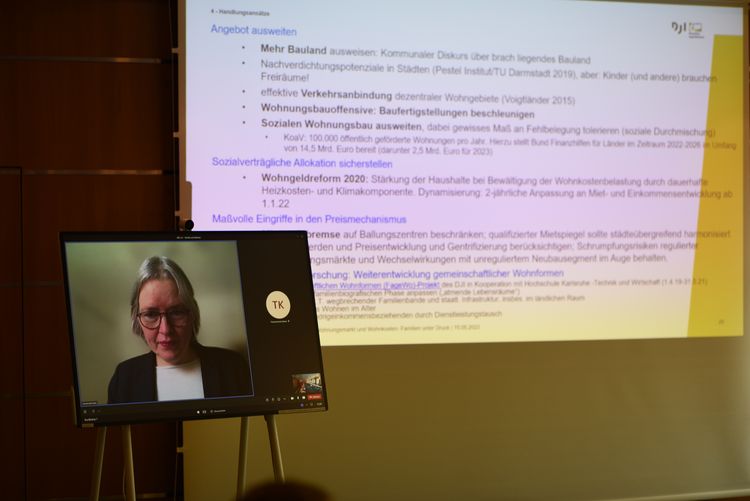
Dr. Christina Boll from the German Youth Institute (DJI) explained the family-specific housing needs and burdens on the housing market. She pointed out that the changes in family life, for instance the increasing importance of social parenthood create new housing needs. In the conditions of strained housing markets, changes in housing needs of a family (for instance because of a change in the family structure like an additional child) bring particularly high burdens, as every change of residence is associated with high increases of the rent. While there used to be “chains” in movement (a family leaves an apartment which can be used be others), those chains have broken down in large cities. This is because of the high rent surcharges when moving and it leads to a growing mismatch of supply and demand in the housing market. For families, this means that families with underage children are increasingly affected by overcrowded apartments. For example, the proportion of minors living in overcrowded housing is six times that of people of 65 and older, she said. As far as overburdening by rental costs is concerned, she showed that this particularly affected single parents, but also persons living alone. In 2021, single parents had to spend an average of about 30% of their household income on housing costs; among single parents at risk of poverty, the average share was almost 43%. She went on to give an overview of housing policy measures that could reduce burdens on families in the housing market in the medium term.

Dr. Reinhard Aehnelt of the Institute for Urban Research and Structural Policy reported on the historical development of housing policy since the last century. He pointed out that there already have been phases in the 1950s and 1990s in which actually a greater number of apartments were built per year than is currently being discussed in terms of target figures for housing construction. Regarding the specific burdens on families, he highlighted three factors being particularly improtatnt: a) general housing supply problems b) access problems for low-income households and c) access problems for households with special characteristics. In the tight housing markets in many regions of Germany, the third factor, among others, has a negative impact on certain types of families. Negative stereotypes among landlords toward families with many children, single parents and families perceived as having a migrant background strongly impair their chances on the housing market. This also applies to pregnant women, people released from prison and indebted households, he said. As measures to relieve the burden on families in the medium term, he mentioned strengthening social housing, strengthening the non-profit sector, an active land policy, strengthening a social allocation practice of the municipalities including the use of occupancy rights.
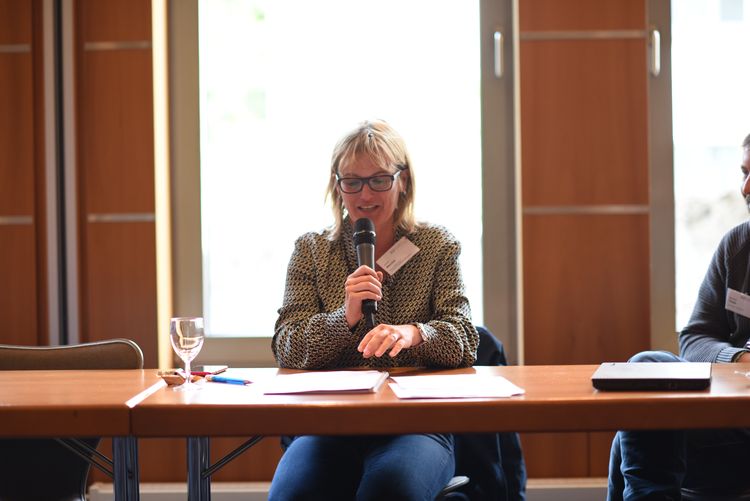
Wibke Werner from the Berlin Tenants’ Association emphasized that different burdens occur depending on the region, as there are large differences in rent levels and development between regions in Germany. She also pointed out the different dynamics of existing rents and new leases. She pointed out the importance of the housing subsidies that have been both expanded and increased, but also emphasized that experience has shown that the housing market “prices” raises in the same manner relatively quickly. With regard to the Berlin housing market, she painted a pessimistic picture regarding a potential ease of the rental housing market situation by the construction of new buildings and apartments. She explained that the targeted numbers of new buildings would be missed clearly. Of the in fact realized newly consrtucted buildings in Berlin in 2021 only less than a third turned out to be classical renting apartments and even less than a tenth have been affordable for low income families. She called for dadditional stimulation of further construction, especially for the affordable rental segment. As an important instrument she sees the currently discussed support of the non-profit housing sector even if this cannot be a short term solution. Additionally, she added, it must be continously ensured that affordable rents in existing buildings are maintained. In Berlin, the demolition of affordable rental apartments must be restricted and the misuse of apartments by temporary rentals and the conversion to furnished rentals must be regulated more strongly. Furthermore, a reduction of the cap of general rent increases and a reform of the modernization allocation, as it has been announced in the coalition agreement of the federal government, is lacking nationwide.
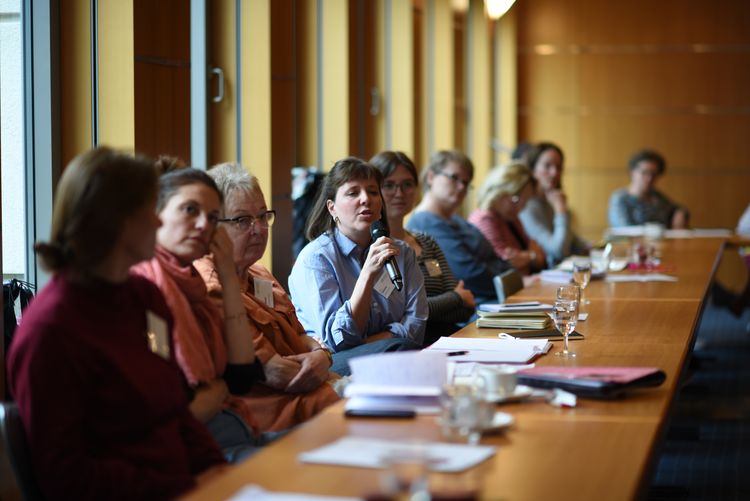
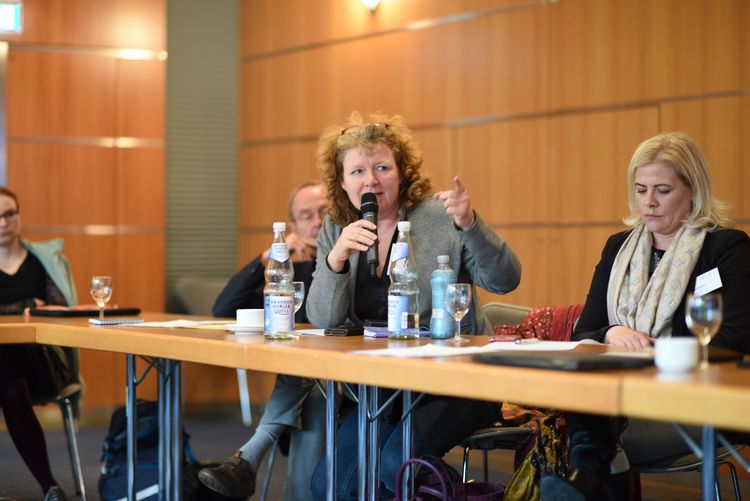

In the concluding discussion, it was emphasized that problems on the housing market are unlikely to be solved in the short term and that many measures must interact and screws must be adjusted in parallel. Medium- and long-term strategies to eliminate the housing shortage must be flanked by measures to combat the acute symptoms of the housing market crisis for families. In principle, people who do not live in families/multi-generational groups are also negatively affected by the current housing market situation. However, compared to an individual life, family life/cycles are particularly characterized by the fact that constellations and thus also housing needs change continuously. The constitution of a family, seen in the formation of a couple relationship or the birth of the first child, goes hand in hand with changing housing needs. The birth of more children leads to different housing needs. Thus, families with several children have a significantly higher housing mobility than other family forms. This housing mobility currently has to be bought at a very high price, as new and renewed leases, as well as new construction or new purchases, are subject to costs that are significantly higher than the price trend in the existing stock.
PROGRAMM (in German)
10:30 Uhr: Anmeldung und Ankommen
11:00 – 11:15 Uhr: Begrüßung
11:15 – 12:00 Uhr:
Politische Maßnahmen zur Senkung der Belastung durch Energiepreise
Mats Kröger, Deutsches Institut für Wirtschaftsforschung
12:00 – 12:45 Uhr:
Wohnungsbedarf, Wohnungsmarkt und Wohnkosten: Familien unter Druck
PD Dr. Christina Boll, Deutsches Jugendinstitut
12:45 – 14:00 Uhr: Mittagspause
14:00 – 16:00 Uhr: Inputs mit Diskussion zur Vertiefung einzener Bereiche
- Besonders belastete oder diskriminierte Gruppen auf dem Wohnungsmarkt an den Beispielen kinderreiche Familien, Alleinerziehende und Familien mit Migrationsgeschichte
Impuls: Dr. Reinhard Aehnelt, Institut für Stadtforschung und Strukturpolitik - Belastungen auf dem Wohnungsmarkt und politische Forderungen aus Sicht der Mieterberatung
Impuls: Wibke Werner, Berliner Mieterverein e.V.
16:00 Uhr: Ende der Veranstaltung

